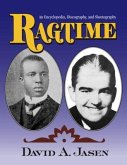In 1919, the world stood at the threshold of the Jazz Age. The man who had ushered it there, however, lay murdered - and would soon plunge from international fame to historical obscurity. It was a fate few would have predicted for James Reese Europe; he was then at the pinnacle of his career as a composer, conductor, and organizer in the black community, with the promise of even greater heights to come. "People don't realize yet today what we lost when we lost Jim Europe," said pianist Eubie Blake. "He was the savior of Negro musiciansin a class with Booker T. Washington and Martin Luther King." In A Life in Ragtime , Reid Badger brilliantly captures this fascinating life, tracing a critical chapter in the emergence of jazz through one man's remarkable odyssey. After an early start in Washington, Europe found his fame in New York, the entertainment capital of turn-of-the-century America. In the decade before the First World War, he emerged as an acknowledged leader in African-American musical theater, both as a conductor and an astonishingly prolific composer.Badger reveals a man of tremendous depths and ambitions, constantly aspiring to win recognition for black musicians and wider acceptance for their music. He toiled constantly, working on benefit concerts, joining hands with W.E.B. Du Bois, and helping to found a black music school--all the while winning commercial and critical success with his chosen art. In 1910, he helped create the Clef Club, making it the premiere African-American musical organization in the country during his presidency. Every year from 1912 to 1914, Europe led the Clef Club orchestra in triumphant concerts at Carnegie Hall, winning new respectability and popularity for ragtime. He went on to a tremendously successful collaboration with Vernon and Irene Castle, the international stars who made social dancing a world-wide rage. Along the way, Europe helped to revolutionize American music--and Badger provides fascinating details of his innovations and wide influence. In World War I, the musical pioneer won new fame as the first African-American officer to lead men into combat in that conflict--but he was best known as band leader for the all-black 15th Infantry Regiment.As the "Hellfighters" of the 15th racked up successes on the battlefield, Europe's band took France by storm with the new sounds of jazz. In 1919, the soldiers returned to New York in triumph, and Europe was the toast of the city. Then, just a few months later, he was dead--stabbed to death by a drummer in his own orchestra. From humble beginnings to tragic end, the story of Jim Europe comes alive in Reid Badger's account. Weaving in the wider story of our changing culture, music, and racial conflict, Badger deftly captures the turbulent, promising age of ragtime, and the drama of a triumphant life cut short.
Bitte wählen Sie Ihr Anliegen aus.
Rechnungen
Retourenschein anfordern
Bestellstatus
Storno








